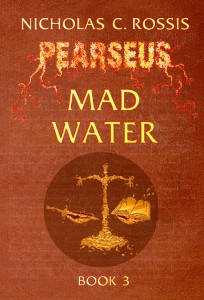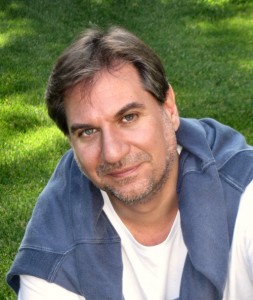It’s time for another edition of Meet the Author! I’m pleased to introduce Nicholas Rossis, author of the fantasy series, Pearseus, as well as sci-fi short stories, and fiction for children. Join me now in welcoming Nicholas Rossis!
Tell us a little about yourself.
Let’s see. I’m your typical statuesque Greek. Or at least I could be with some diet and a lot of exercise. Assuming the plastic surgeries took. Anyway, I’m also an avid reader and architect by training. Instead of building houses, however, I have been writing books and developing websites for the past 20-odd years.
I live in Athens, Greece, in the middle of a forest, with my wife, dog and two very silly cats, one of whom is always sitting on my lap, so please excuse any typos in this interview: typing with one hand can be hard…
What inspired you to write the Pearseus series?
The concept of Pearseus came to me after reading Martin’s Song of Fire and Ice series, followed by Jim Lacey’s The First Clash and Herodotus’ Cyrus the Great and Rise of Persia, which describe the fatal battle on Marathon between Greece and Persia in the 5th century BC. Marathon is a 20’ drive from my home, and I’d often visited the tomb where the ancient Athenians buried their dead, so I thought at the time, “wouldn’t it be great if someone did what Martin did for medieval England, only with the story of Greece vs. Persia? And in space? How cool would that be?” Then it occurred to me: so, what’s stopping me from writing it?
What’s the novel about and who would enjoy it?
Most fans of science fiction and fantasy should enjoy it, with a few caveats. First of all, it has a lot of twists and character development, so it’s not for those interested in one big space battle after another. I’m more interested in exploring what makes people tick, including politics, philosophy and religion. Finally, there’s pretty little sex…
What do your characters, David, Lehmor, and Moirah, yearn for?
To me, life is struggle and a lesson we must all learn, one that’s different for everyone.
Each of these characters longs for a different thing, and they lose what they most desire before they can win it back again.
David longs for security. He thinks he has found it when he joins the Voice, as she can guide him without mistake. Without realizing it, he sacrifices his freedom of choice by listening to her infallible advice, then in book 3 (just released) he loses her, and betrays everything he believes in to win her back.
Lehmor is a warrior, born to lead his clan when his father passes away. When he loses his arm, he loses his very identity, and struggles to build a new one. He does that through his wife, mostly, but also through his friends, David and Cyrus.
Like Lehmor, Moirah is a warrior and a leader’s daughter. However, she sacrifices her ambition to avoid hurting Lehmor by leading over him. No one except for David seems to realize this, and her hidden fascination with Cyrus’ power leads her to betray her husband, under the influence of the Whispers.
What do you think makes for great fantasy fiction?
Primarily, fantasy authors continue the great romantic tradition of describing the struggle between good and evil. Tolkien is the greatest example of this. People think his fiction is great because of the richness of his world. To me, that is part of it, but his books are great mostly because of the war between Eru Iluvatar, Melkor and their servants. It is no coincidence that Tolkien had been through the second world war, pitting the evil of Nazis against the fight of men.
However, modern fantasy has taken this tradition one step further, and few can pull off such a manicheistic view of the world – good vs. evil. Modern readers tend to be more sophisticated, and I for one frown at a one-sided character, whether good or evil.
So, to me, great fantasy fiction requires well-developed characters. This means that heroes need their flaws, just like anti-heroes must have their redeeming features.
Styx murdering General Parad’s son and feeding him to his father during a banquet has the ring of mythology and Greek tragedy to it. What do you think those elements bring to a story?
I hope I’m not revealing too much if I tell you that the General’s son escapes, and a pig gets slaughtered instead, tricking Styx into believing she is performing this unfathomable act.
In fact, I struggled a lot with that scene. I don’t describe it at all, only Parad’s feelings when he thinks he’s been served his son. Even so, I didn’t want to make it a bigger deal than it already is. You see, the overall story arc is copied from Herodotus, who describes the coming to power of Cyrus, king of the Persians. Styx’s terrible crime is taken straight from him, and I realize that a lot of people had trouble with that part (myself included), but hey, I blame a long-dead Greek dude.
Having said that, Greek mythology is peppered with similar acts, like Cronus eating his own children, so I grew up listening to such harrowing tales. In my mind, they are not that much worse than the Grimm brothers’ fairy tales – say, when two children about to be baked by an evil witch kick her into a burning-hot oven.
However, in the latest version of the book, I ended up moving Cyrus’ escape to the very beginning, as a lot of readers did not read long enough to realize the ruse, having freaked out by Styx’s actions!
As to what something like that brings to the story, I think it’s easy enough to answer: emotion. People can’t help but react emotionally to a terrible crime like this.
Of course, it also presents a challenge: Styx could not be more of a villain, if she was a chain smoker. Then, the challenge becomes to let people understand her reasons for her actions, in accordance to what I was saying before, about the need for anti-heroes to have redeeming qualities. In fact, the highest praise a reviewer has given me was to say that she almost felt sorry for Styx.
Who are some of your biggest influences as a writer?
Mostly Philip K. Dick, whom I consider a modern-day prophet, visions and all. Richard Bach, for his brilliant Jonathan Livingston Seagull. William Gibson, for his amazing Neuromancer. Neil Gaiman for breaking down the walls between the various genres and media. Frank Herbert, especially his amazing third book, God Emperor of Dune. Also, I’m partial to Jorge Luis Borges and the magical realism school; they have influenced my work greatly. Finally, Lao Tzu, whose Tao Te Ching I have spent a year translating into Greek. He has influenced not just my writing, but also my way of thinking.
Not to down play the others, but I’m huge on Borges, too. How do you approach crafting a novel, in particular, a series?
Lol – awkwardly! Since Pearseus is my first series, I struggle with questions like, how much exposition is necessary from book to book and how much of a back story is necessary.
At first, books one and two – Schism and Rise of the Prince – were conceived as a single book. However, the three centuries between them meant that they worked better as two separate entities, so I broke them up.
Mad Water, book three, however, picks up the story where Rise of the Prince left off. To help the reader, I have included a fair bit of exposition at the beginning and have peppered the text with brief reminders where my beta-readers had forgotten characters or plot points. Also, I have written an extensive character list at the beginning. I have no idea what to do with book 4, though; probably include a disclaimer that you need to have read the previous books to make sense of it!
What’s ahead for you?
Mad Water, the third in the series was just published, so I will promote that while writing the next one, which I hope to have ready by Christmas.
I am also writing short science fiction stories; the first anthology of these, The Power of Six, has already been published. I am now writing a second one, as I find short stories a welcome distraction from the more demanding epic nature of Pearseus.
Finally, I’m having Runaway Smile, my first children’s book, illustrated. My illustrator friend, Dimitris Fousekis, is a perfectionist, though, and we’re already behind schedule, so I’d rather not venture a guess as to when it will be published. He just spent a month designing a new font for the chapter titles, feeling that none of the existing fonts (including a great one he had designed himself a few years ago) were good enough for Runaway Smile.
This is a completely different genre, obviously, but one that has a lot of commonalities with fantasy. It is easier for children to use their imagination, and I love that, finding writing for them a liberating experience. One that allows me to explore my more surreal side; something exhilarating and fun.
Synopsis of Pearseus Book III: Mad Water
In the third book of the best-selling Pearseus series, the incessant scheming of the various players and their nebulous puppet-masters has brought about major change. Cyrus is now the new ruler of the Capital, struggling to fight Jonia’s revolt along with his own demons. Gella strives to keep abreast of Teo’s devious plans in order to end the war with Jonia. David returns to the First in an effort to overcome his loss of the Voice. Lehmor’s struggle to reunite with Moirah brings him to uncharted territories, where the enigmatic Iota play with minds, senses and the future of the entire planet.
Old foes and unlikely new friends appear as invisible forces continue to pry humanity apart. Masks drop to reveal the ultimate truth: on Pearseus, everyone has their own agenda. And they’ll stop at nothing to achieve it.
About Nicholas Rossis
Avid reader. Web developer. Architect by training, holder of a PhD in Digital Architecture from the University of Edinburgh. Now, author.
Nicholas loves to write. His first children’s book, Runaway Smile, is currently being illustrated. Mad Water, the third book in his epic fantasy series, Pearseus, will be published on July 15th, 2014, unless he’s caught for murdering his deadline-ignoring illustrator. He has also published The Power of Six, a collection of short sci-fi stories.
He lives in Athens, Greece, in the middle of a forest, with his wife, dog and two very silly cats, one of whom is always sitting on his lap.
Purchase links
Pearseus, Schism (Book 1)
Pearseus, Rise of the Prince (Book 2)
Pearseus, Mad Water (Book 3)
The Power of Six, six plus one science fiction short stories
Follow Nicholas Rossis:



